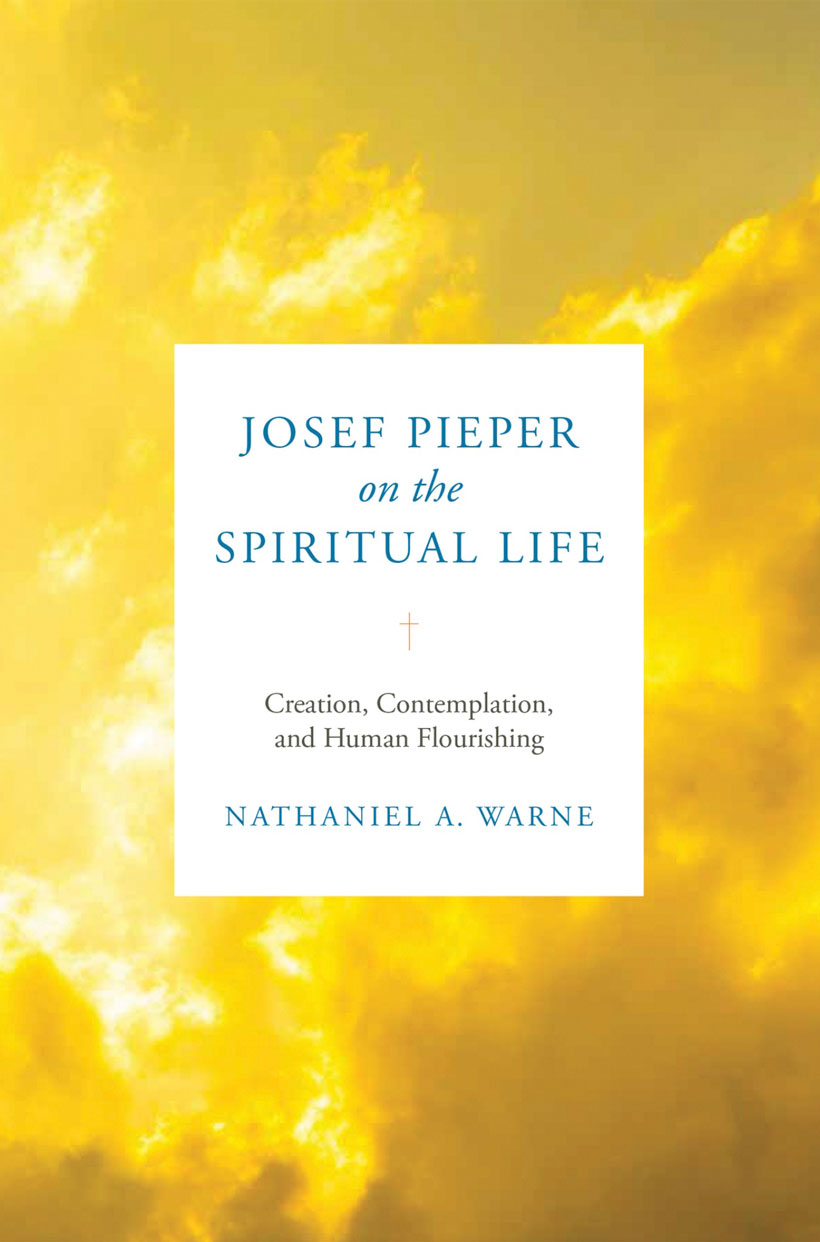Josef Pieper on the Spiritual Life
Creation, Contemplation, and Human Flourishing
By Nathaniel A. Warne
University of Notre Dame Press, 328 pages, $95
 More people should read Josef Pieper. A Catholic German philosopher who lived from 1904 to 1997, Pieper shaped theological luminaries like Joseph Ratzinger and Hans Urs von Balthasar. An acuity distinguishes his insight; a lucidity distinguishes his prose. This combination makes him excellent reading for non-academics, especially undergraduates. An encounter with Pieper’s Leisure: The Basis of Culture as an undergraduate transformed my vocation to academic theology, and I am happy now to teach that book and others by Pieper to my students today. His diagnosis of a productivity-obsessed culture and his prognosis of a contemplative life strikes a chord with young adults.
More people should read Josef Pieper. A Catholic German philosopher who lived from 1904 to 1997, Pieper shaped theological luminaries like Joseph Ratzinger and Hans Urs von Balthasar. An acuity distinguishes his insight; a lucidity distinguishes his prose. This combination makes him excellent reading for non-academics, especially undergraduates. An encounter with Pieper’s Leisure: The Basis of Culture as an undergraduate transformed my vocation to academic theology, and I am happy now to teach that book and others by Pieper to my students today. His diagnosis of a productivity-obsessed culture and his prognosis of a contemplative life strikes a chord with young adults.
Thus, Nathaniel Warne — an academic theologian and priest in charge of St. Paul’s Episcopal Church in Mishawaka, Indiana — has done us a service in recovering Pieper’s vision. Believing that “Pieper’s is an important and overlooked voice in the history of philosophy, theology, and twentieth-century Thomism,” Warne rectifies this oversight and, in so doing, discerns in Pieper’s seemingly sprawling work — spanning topics such as language, the virtues, and education — an overarching vision relevant for our time.
Warne rightly divines that creation forms the central motif of Pieper’s work. As a good philosopher, Pieper begins with the whole, a whole that he does not take for granted in its created givenness, and sees the vision of that whole as the asymptotic goal of the philosophical task. Because it is given by God, creation is intrinsically good and intelligible. But, since it comes from the God who evades total comprehension, it also can never be fully exhausted by the human mind: “Just as we cannot comprehend the divine essence, we are unable to grasp fully creation.” The mystery of the created order beckons us to plumb ever more the depths of its loving Creator.
For Pieper, then, earthly happiness and fulfillment reside in the act of contemplating this whole. To know the foundations of the world — to know why there is something rather than nothing — is what “we thirst” for and so “it is in the vision of the created order that thirst can be quenched.” This activity entails a silent, attentive receptivity, a type of knowing that the medievals classified as the more meditative intellectus rather than the more calculative ratio. Warne establishes how Pieper’s studies of the cardinal and theological virtues serve this contemplative end. To posit contemplation as the apex of being human relativizes (though not dismisses) all other types of more practical knowing.
To make this bold anthropological claim cuts against the grain of much contemporary culture, after all. Pieper himself warned against the creeping totalitarianism of “total work” and lamented a frenetic restlessness that masks a nihilistic boredom. Sounding like a true prophet, Pieper declared in 1957 that “[t]he greatest menace to our capacity for contemplation is the incessant fabrication of tawdry empty stimuli which kill the receptivity of the soul.” Tell Mark Zuckerburg the news! If it is through contemplation that human beings fulfill their vocation, the loss of our contemplative capacities can only endanger our humanity and degrade the entire created order.
Pieper offers many antidotes to this crisis. He hails a liberal arts education that broadens our visions, an “asceticism of perception” that retrains our attention, artistic and poetic exercises able to surmount the hegemony of calculative thinking, and prayer that points beyond the immanent frame. Above all, however, the antidote is Christ; Werne’s book unveiled the Christocentricity of Pieper’s project for me. It is by meditating on Christ — who “is the light that illuminates all things and is the transcending principle of all things, is the measure and light of all things” and the revelation of humanity’s eschatological destiny — that we see the reason why there is something rather than nothing and the depths of our loving Creator. We can thank Warne (and Pieper) for helping us contemplate this belief more clearly.




